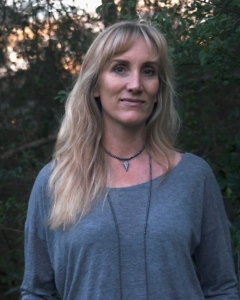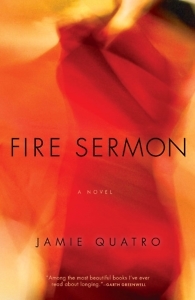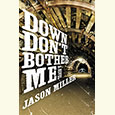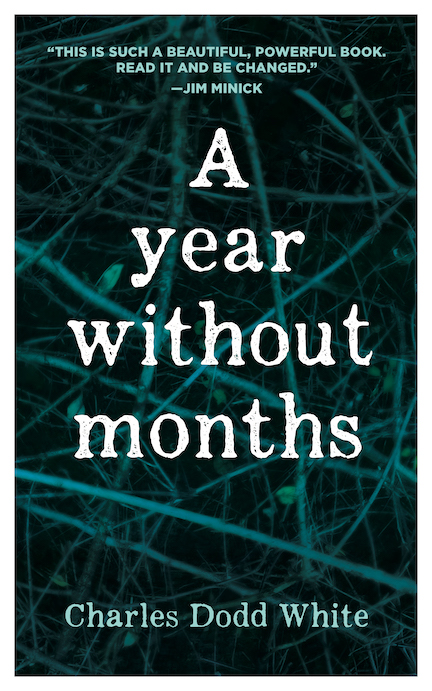So Let Me Burn
In Fire Sermon, Jamie Quatro explores the intersections of love, obsession, and spirituality
Jamie Quatro begins her debut novel by positioning the consummation of an affair against the commencement of a marriage. The first pages show Maggie, a short-story writer, and James, a poet, en route to the inevitable fulfillment of mutual desire. Quatro follows this scene with a recounting of Maggie’s wedding twenty-five years earlier, an idyllic afternoon on the coast in Malibu.

Each scene concludes with an image of death. As James pulls her from the cab they’ve shared toward the door of the hotel, Maggie thinks, “The safe way to let yourself fall in love with someone who isn’t your spouse: imagine the life you might have together after both your spouses have passed away.” At the conclusion of her wedding, Maggie toggles forward to the present, describing a package delivered from her recently deceased grandmother that contains eleven handkerchiefs to replace the one Maggie lost on her wedding day. A letter in the package reveals that the grandmother had sewn the handkerchiefs for her true love, whom she’d lost after a quarrel. “I embroidered one hankie a month the year I waited for the telephone to ring,” the letter reads. “Perhaps they’ll remind you to always be the one to call back first.”
These are but the first of a cascade of rich, illuminating images which distinguish Fire Sermon from the many other literary novels about infidelity. Indeed, the territory is well-trod, as Quatro herself acknowledges. “I imagine writing all this down and giving the manuscript to my agent,” Maggie writes. “This has been done to death, she says. I won’t be able to sell this.” Fire Sermon transcends the familiarity of its subject matter through its formal originality, its erudite meditations on the intersections of religious devotion and erotic desire, and the breathtaking lyricism of Jamie Quatro’s prose, which manages somehow to be both intensely elegiac and as fluent as good conversation.
Given the acclaim garnered by Quatro’s 2013 story collection, I Want to Show You More, the anticipation surrounding her debut novel has been intense. Fire Sermon fulfills Quatro’s promise in dazzling fashion, meeting and at times exceeding the precocity and daring of her first published work. Quatro acknowledges a variety of obvious influences, among them Virginia Woolf, James Salter, Flannery O’Connor, John Newton, and C.S. Lewis. But there are also echoes of Kate Chopin’s The Awakening and Nabokov’s Pale Fire.
 The plausibility and resonance of Fire Sermon hinge on the extent to which a reader accepts Maggie’s dilemma as a woman who sees grave sin in the pursuit of passion outside a troubled marriage. Quatro roots Maggie’s disposition in her devout Christianity and her obsessions with the more literary strains of theology. After surrendering her virginity during a college make-out session, Maggie returns to her dorm room, kneels beside her bed to pray, and vows to God that she will marry Thomas so as to ameliorate the sin of pre-marital sex.
The plausibility and resonance of Fire Sermon hinge on the extent to which a reader accepts Maggie’s dilemma as a woman who sees grave sin in the pursuit of passion outside a troubled marriage. Quatro roots Maggie’s disposition in her devout Christianity and her obsessions with the more literary strains of theology. After surrendering her virginity during a college make-out session, Maggie returns to her dorm room, kneels beside her bed to pray, and vows to God that she will marry Thomas so as to ameliorate the sin of pre-marital sex.
Years later, after their two children are born, she finds herself unable to become aroused by him. Thomas, a successful financial planner, is a “good husband,” but far from perfect—his impatience with his wife’s disinterest eventually takes the form of pathetic attempts to bring sex toys into the bedroom and, far more sinister, marital rape. There is ample evidence, particularly after their children have left for college, that Maggie should see herself as entitled to leave the marriage, or, at the very least, to confront Thomas with her dissatisfaction, particularly after she meets James and senses almost instantly that their connection runs much deeper than a shared interest in contemporary poetry. “We discussed the ontological versus cosmological arguments for the existence of God, and whether the universe exists in esse, like a house (deism, Aristotle) or in fieri, liquid in a vessel (theism, Aquinas).”
If you can’t relate to the kind of people for whom such talk is simmering foreplay to a steamy hotel-room tryst, or if you take umbrage at the comparison of a lover to a Catholic priest administering the host—“For this I was ordained, there is no one else who can administer this sacrament, in this moment I am the only one who can give you what you need, his fingers lacing into mine as he pulled me through the revolving doors behind him”—perhaps Fire Sermon isn’t the book for you.
I would argue, however, that there is a clear connection between eros and religious devotion. The subject of a woman being torn between passion and faithfulness to a sacred vow isn’t “done to death” if the subject is delineated with the intensity and artistry on display in the pages of Quatro’s Fire Sermon.
There are so many moments in this fine debut that call to be read and re-read, flipped over and scrutinized—moments of searing, painful truth and gorgeously articulated delusion which ring with their own sort of truth about the lengths to which we will go to make sense of the inexplicable. Isn’t this the task of great fiction? Isn’t mystery, ultimately, as much as anything else, what God and Love have in common?

Ed Tarkington’s debut novel, Only Love Can Break Your Heart, was published by Algonquin Books in January 2016. He lives in Nashville.


